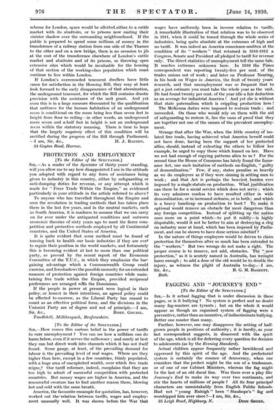[To the Editor of the SPECTATOR.] SIR, —How comes this curious
belief in the power of tariffs to cure unemployment ? You can see how a milldam can do harm below, even if it serves the millowner ; and surely at best they can but direct work into channels which it has not itself found. Some gauge, at least, of the prevailing demand for labour is the prevailing level of real wages. Where are they higher than here, except in a few countries, thinly populated, with a huge area of unexploited wealth, over which free trade reigns,? Our tariff reformer, indeed, complains that they are too high to admit of successful competition with protected countries. But money wages are higher in America, and the resourceful creature has to find another reason there, blowing hot and cold with the same breath.
- America, the favourite ensample for quotation, has, however, worked out the relation between tariffs, wages and employ- . meat unusually well. It was shown before- the War that
wages have uniformly been in inverse relation, to tariffs. A remarkable illustration of that relation was to be observed in 1911, when if could be traced through the whole series of industries, being quite absolute at the extremes of high and no tariff. It was indeed an America conscience-smitten at the condition of its " workers " that returned in 1910-1912 a Congress, Senate and President all pledged to tariff for revenue Only. The direct statistics of unemployment tell the same tale. It reaches extremes unknown here. In 1910 the TiMis correspondent was reporting twenty-five per cent. of the trades unions out of work ; and later On Professor Nearing, in his book on Wages in America, the fruit of twenty years' research, said that unemployment was so frequent that to get a just estimate you must take the whole year as the unit. He had found twenty per cent. of the year idle a fair deduction as an average for industrial America !, _ And yet she is without that state paternalisin which is crippling production here !
The McKenna duties were imposed to restrain-trade ; and Succeeded. On those who would rely on them with the aid of safeguarding to restore it, lies the onus of proof that they are together not one of the causes of the prevalent unemploy-
. ment.
Strange that after the War, when the little country of iso- lated free trade, having achieved what America herself could not have done, having been the support of her protected allies, should, instead of exhorting the others to -follow her example, be urged to copy those which leaned on her. Have we not had enough of copying patterns alien to us ? For the second time the House of Commons has lately found the Insur- ance Act,"one such imitation of methods un-English, " guilty of demoralization." Few, if any, states penalize so, heavily as we do employerd as if they were sinning in setting men to work ; and that Act is perhaps the heaviet burden ever imposed by a single,statute on production, What_ justification can there be for a social service which does not serve ; which its very admirers confess to have .resulted either in wide demoralization, or in increased sickness, or in bOth and which is a heavy handicap on produetion to boot ? To: make it optional would remove an obstacle far more dangerous than any foreign competition. Instead of splitting up the nation once more on a point whichL-10 put it Mildlk-is , highly disputable, would it not be better to,aim at destroYing a dog on industry near at hand, which has been imposed tiy. Parlia- ment, and can be shown to have done -serious Mischief ? -
In the nature of things employers would be driVen to claim protection for themselves after so much has been extended to the " workers." But two wrongs do not make a right. - The 'proper course is to remove, not add, obstaclei. The ""new protection," as it is acutely named in Australia, wrought harni enough ; to add a dose of the old would be to double the injury, as witness the Plight' of Austrolls to-day.Hl


































 Previous page
Previous page